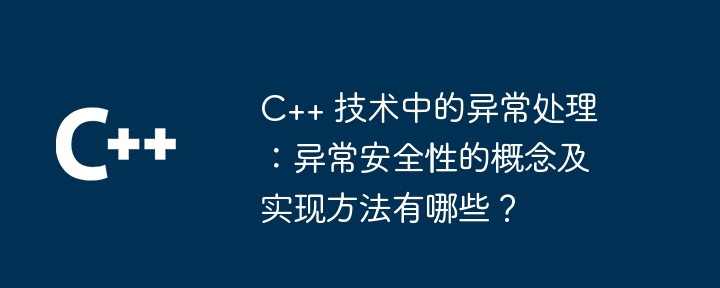
C Exception handling ensures that the program remains robust, recoverable, and has no resource leaks when handling exceptions through try-catch blocks, noexcept specifications, dynamic checks, and smart pointers. When an exception occurs, the try-catch block captures and handles the exception; noexcept specifies that the function will not throw an exception; dynamic checking checks for exceptions during code execution; smart pointers automatically manage memory to prevent resource leaks.

Exception handling in C: The concept and implementation method of exception safety
In C, exception handling is a kind of management A powerful mechanism for unexpected situations and abnormal behavior in programs. It allows you to handle error conditions reliably, preventing program crashes.
The concept of exception safety
Exception safety refers to ensuring that the program does not enter an inconsistent or illegal state when handling exceptions. It involves the following key principles:
Exception handling implementation methods
C provides a variety of methods to implement exception handling, including:
1. try-catch block
This approach uses try and catch blocks to catch and handle exceptions.
try {
// 容易引发异常的代码
} catch (std::exception& e) {
// 处理 exception 异常
}2. noexcept specification
noexcept Specifies that the function will not throw any exceptions. If a function throws an exception, the compiler will generate an error.
int myFunction() noexcept {
// 不会引发异常的代码
return 0;
}3. Dynamic checking
This is a technique to check for exceptions during code execution. It uses functions like dynamic_cast and std::current_exception.
4. Smart pointers
Smart pointers can be used to automatically manage memory to prevent resource leaks when handling exceptions.
std::unique_ptr<int> ptr(new int);
Practical case
Consider a function that opens a file, which may cause a variety of exceptions, including file non-existence, insufficient permissions, etc.
#include <fstream>
void openFile(const std::string& filename) {
std::ifstream file(filename);
if (!file.is_open()) {
throw std::runtime_error("Failed to open file: " + filename);
}
// ... 对文件执行操作
}The caller can use the try-catch block to handle exceptions:
try {
openFile("myfile.txt");
} catch (std::runtime_error& e) {
std::cerr << e.what() << std::endl;
}By implementing exception handling, we can maintain the robustness of the program and recover when exceptions occur to a consistent state and prevent resource leaks.
The above is the detailed content of Exception handling in C++ technology: What are the concepts and implementation methods of exception safety?. For more information, please follow other related articles on the PHP Chinese website!
 What are the differences between c++ and c language
What are the differences between c++ and c language
 Recommended learning order for c++ and python
Recommended learning order for c++ and python
 Cost-effectiveness analysis of learning python and c++
Cost-effectiveness analysis of learning python and c++
 Is c language the same as c++?
Is c language the same as c++?
 Which is better to learn first, c language or c++?
Which is better to learn first, c language or c++?
 The difference and connection between c language and c++
The difference and connection between c language and c++
 C++ software Chinese change tutorial
C++ software Chinese change tutorial
 Cost-effectiveness analysis of learning python, java and c++
Cost-effectiveness analysis of learning python, java and c++




